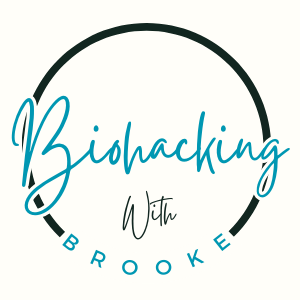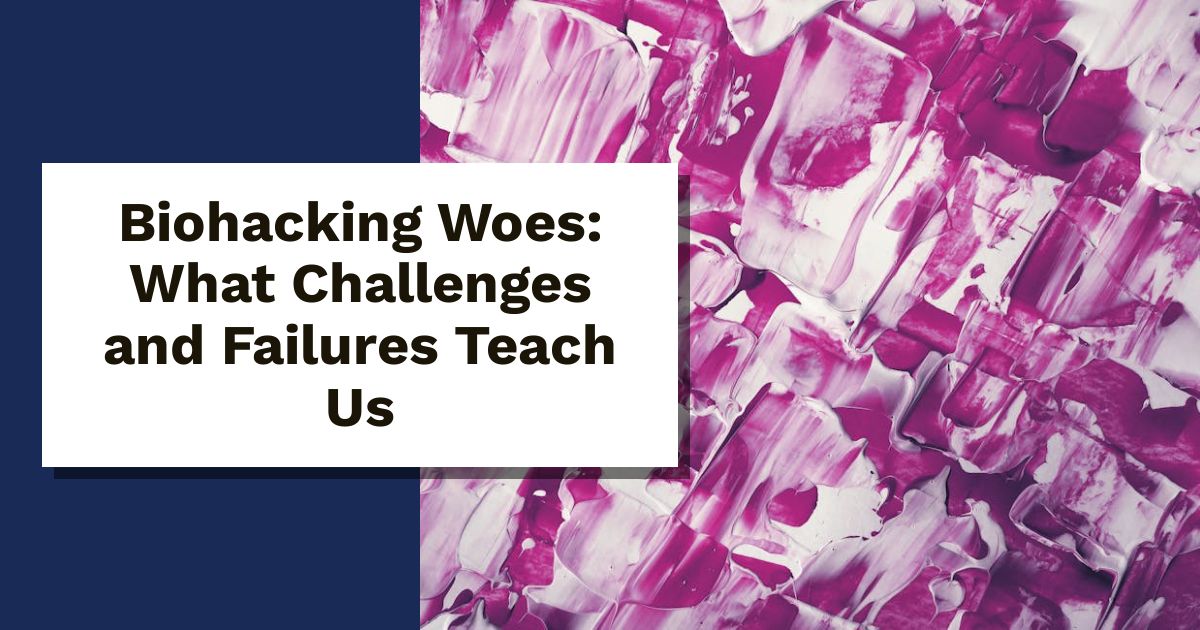Biohacking can be a fascinating adventure, offering promises of enhanced health and performance. But what’s often overlooked are the bumps along the way. This journey isn’t all smooth sailing; it’s filled with challenges and failures that can feel discouraging.
Every setback has a lesson. By acknowledging what went wrong, you can find ways to improve and adapt. In this post, we’ll unpack some common obstacles biohackers face and explore the valuable insights they’ve gained. Whether you’re just starting or refining your practice, understanding these hurdles can set you up for success. Let’s jump into the lessons learned from the ups and downs of biohacking!
Common Challenges in Biohacking
Biohacking offers many exciting opportunities to optimize health and performance. However, navigating this world is not without its challenges. Let’s break down some of the common hurdles faced by biohackers.
Lack of Reliable Information
Finding trustworthy information can feel like searching for a needle in a haystack. With so much content out there, it’s easy to stumble upon misleading claims. Misinformation can lead to poor choices, impacting health and performance negatively. For those interested in biohacking, it’s crucial to rely on credible sources. Relying on anecdotes or unverified studies can bring more harm than good. For a deeper understanding, check out The Truth About Biohacking.
Experimenting Without Guidance
Jumping into biohacking without expert advice is risky. Many enthusiasts start experimenting solo, thinking they can figure it all out on their own. However, without proper guidance, they may not recognize warning signs or potential dangers. Not all hacks are safe. Collaborating with knowledgeable professionals ensures that your experiments remain beneficial and don’t jeopardize your health. Want to learn more about safe biohacking practices? Check out Biohacking: A Beginner’s Guide.
Access to Technology and Resources
Biohacking often requires specific tools and technologies, which might not be readily available to everyone. Some techniques need expensive equipment or specialized software, making them inaccessible for many. This limitation can stall progress and keep individuals from reaching their goals. However, many simple biohacking methods can be done with everyday items. For innovative tools and how to use them, see 17 Types of Biohacking Technology to Transform Your Health.
Skepticism from the Medical Community
Many in the medical community approach biohacking with skepticism. This makes it hard for biohackers to find support or validation for their practices. Skepticism often arises from concerns about safety and efficacy, especially regarding unregulated practices. This discord can leave biohackers feeling alienated. Engaging with healthcare professionals who understand biohacking can help bridge this gap. For insights on the evolving conversation between doctors and biohackers, explore Why Some Swear by Biohacking While Others Raise Concerns.
Time and Commitment
Biohacking isn’t a one-and-done initiative. It requires consistent effort, time, and dedication. For those leading busy lives, finding the time to track progress, make changes, and implement new techniques can be overwhelming. Many potential biohackers may feel discouraged and back away, thinking it’s not worth the time investment. However, small, incremental changes can yield significant benefits over time without requiring all-consuming effort. Curious about the real commitment needed for effective biohacking? Check out more at Biohacking: What is it, Types and Hacks.
Famous Biohacking Failures
Biohacking might promise enhanced performance and well-being, but it’s not all smooth sailing. Various famous failures highlight the crucial lessons learned along the way. Let’s explore some notable biohacking mishaps and the valuable takeaways they offer.
Case Study: Quantified Self Movement
The Quantified Self movement encourages individuals to track personal data to optimize their health. However, many enthusiasts find themselves lost in a sea of numbers without understanding their significance. Collecting data on sleep, diet, and exercise without context can lead to misinterpretation and anxiety. Relying solely on metrics might cloud judgment and overshadow important qualitative aspects of health. For a deeper dive into these pitfalls, read about the ramifications of the Quantified Self.
The Risks of DIY Genetic Engineering
Amateur genetic engineering might sound thrilling, but it carries severe risks. With the rise of mail-order CRISPR kits, anyone can dabble in gene editing without proper training. These hacks can lead to unintended consequences, including dangerous mutations or harmful pathogens. The lack of oversight in DIY biohacking can create potential risks not only for the hacker but also for public health. Check out this article on mail-order CRISPR kits to learn more about the dangers involved.
Supplements Gone Wrong
The supplement industry offers a vast array of products that promise incredible benefits. However, misuse can lead to serious health issues. For example, numerous cases highlight the adverse effects of excessive vitamin consumption or unregulated weight-loss supplements. Many individuals have faced severe consequences from using these products irresponsibly. For insights into the dangers of dietary supplement misuse, explore this report on the dangers of dietary supplement misuse.
Extreme Diets Backfiring
Extreme dieting can seem like a quick fix but often leads to more harm than good. Many crash diets promise rapid weight loss but can cause electrolyte imbalances, malnutrition, and other health concerns. Numerous individuals have found themselves needing medical help after trying unbalanced diets. To understand the potential hazards of extreme dieting, visit this resource on the risks of crash diets.
Wearable Tech Failures
Wearable technology is all the rage, but not all devices live up to their promises. Issues with accuracy, inconsistent readings, and durability undermine their effectiveness. Trusting unreliable data can lead to poor health decisions and misplaced confidence in one’s biohacking journey. To get a clearer picture of these challenges, check out this analysis on wearable tech reliability.
Understanding the challenges and failures in biohacking helps us recognize the importance of careful experimentation and informed choices. Each setback presents a valuable lesson that can guide future endeavors.
Lessons Learned from Biohacking
Biohacking is a thrilling journey that can teach you a lot. Each experiment brings its own set of lessons. Below, we explore key insights that help you navigate this world more wisely.
Importance of Research
Before diving into biohacking, research is your best friend. Understanding the science behind your chosen hack can save you from potential pitfalls. Scouring credible sources helps you separate the helpful tips from the harmful myths. Relying solely on anecdotal evidence can be misleading. Instead, arm yourself with information from reliable sites. For an introductory look at biohacking and its impacts, visit The Truth About Biohacking.
Consulting Experts
Navigating the biohacking waters can be tricky. That’s where consulting experts comes in. Seeking advice from knowledgeable individuals can guide you safely through your experimentation. Whether it’s doctors, nutritionists, or seasoned biohackers, professional insights can illuminate best practices and avoid serious mistakes. If you need personalized support, check out resources like Biohack Corp for expert consulting.
Start Small and Build Up
When you’re eager to start biohacking, it’s best to start small. Minor adjustments can lead to significant changes over time. For instance, tweak your diet or add a new exercise routine before attempting more complex hacks. Gradual changes allow your body to adapt without overwhelming it. Interested in beginner-friendly advice? Explore Biohacking: A Beginner’s Guide.
Documenting Your Journey
Keeping a detailed log of your biohacking journey can be a game-changer. Tracking what works and what doesn’t provides valuable insights. You can see patterns, make adjustments, and celebrate your progress. Use apps or journaling methods that suit you. This process not only nurtures accountability but also motivates you to stay on track. For tips on documenting effectively, check out Guide To Biohacking For Health Optimization and Longevity.
Community Support is Key
Biohacking doesn’t have to be a solo journey. Connecting with other biohackers creates a support system that’s essential for encouragement and shared knowledge. Engaging in communities, whether online or offline, can provide inspiration and help you overcome obstacles. Look for local groups to share experiences and tips. Joining communities like MyBioHack Support and Biohacking can expand your network and knowledge.
Each lesson learned from biohacking helps refine your approach. With the right preparation, expert guidance, small steps, detailed documentation, and a strong community, you can navigate your biohacking journey more effectively.
Conclusion
Challenges and failures are not roadblocks but stepping stones in the biohacking journey. Each setback provides a chance to learn and grow, shaping your approach and enhancing your understanding. Embracing these lessons empowers you to make informed choices that lead to better outcomes.
Don’t shy away from failures; instead, view them as vital experiences in your evolution as a biohacker. Reflect on what went wrong and adjust your strategies accordingly.
As you continue your biohacking efforts, remember: the road may be bumpy, but the insights gained can pave the way for success. What challenges have you faced in your biohacking journey?
Brooke is a rock-climbing 🧗♀️, tennis-playing 🎾, biohacking 🧬 bookworm 📚 on a mission to unlock the secrets of health, longevity, and living life to the fullest 🌟. When she’s not scaling cliffs, hitting the courts, or testing out the latest hacks, you’ll find her nose in a book or adventuring with her four-legged best friend 🐕 by her side. With a knack for turning science into simple, actionable tips, Brooke’s writing is your guide to hacking your biology and living your best, most vibrant life!


